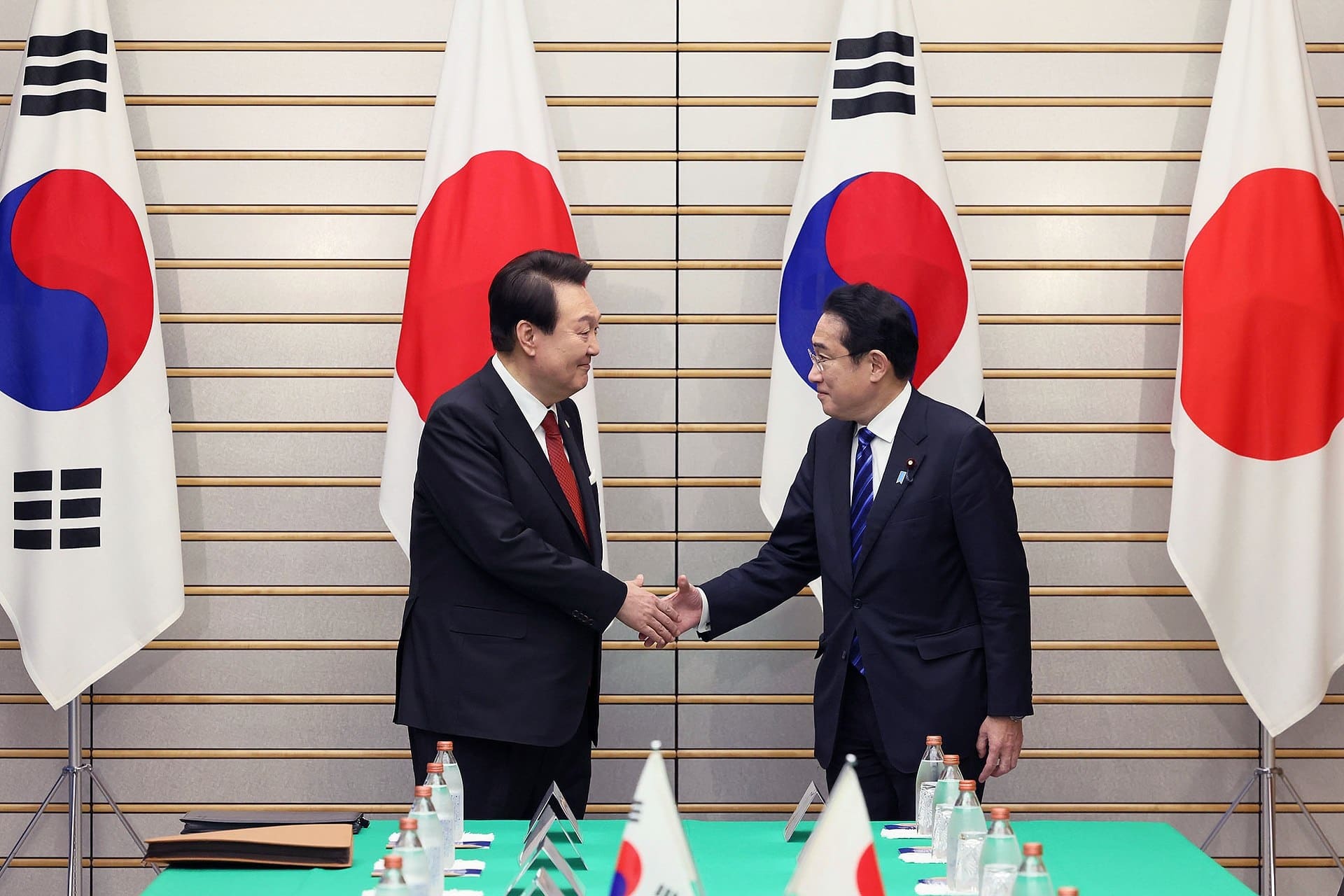South Korean President Yoon Suk-yeol has prioritized fixing South Korea’s relationship with Japan. Since taking office last spring, he has made a concerted effort to alleviate deep-running historical strains that revolve around Japan’s ambiguous attitudes about its behavior in Korea in the first half of the 20th century.
The administration of U.S. President Joe Biden has almost certainly pushed the two countries to reconcile. Both are U.S. allies, but they scarcely cooperate with each other. The Biden administration views China as the major challenger to U.S. power in the coming decades, and democracies in Asia as various as India, Japan, and Australia also share a basic desire to block Chinese regional hegemony. That task becomes significantly harder, though, if Japan and South Korea cannot cooperate. In a Taiwan contingency, for example, Japanese and South Korean assistance would be very valuable. The U.S. would expect both states to at least provide air space access and logistical assistance, if not fighting capabilities.
The Strategic Argument
South Korean opinion on foreign policy is sharply divided between right and left. Conservatives take a fairly traditional view of international politics, particularly in the region. North Korea is an Orwellian tyranny, they believe, and Korea should be unified under South Korean leadership just as Germany was unified under West German leadership. China and Russia are autocracies with whom South Korea should maintain a business-like relationship for trade purposes, but not a close political relationship.
Conversely, as a democracy, South Korean conservatives are comfortable aligning the country with the U.S. — the alliance between the two is now 70 years old — and somewhat with Japan. Disappointment with Japan’s mixed apologies for the colonial period is widespread, but to conservatives, this does not undercut modern political realities. Japan is a democracy, while China and North Korea are not. This broadly replicates the regional alignment of the Cold War, and this political position sees South Korea fit comfortably under the U.S. regional security umbrella. President Yoon has spoken in support of this framework throughout his presidency.
South Korean progressives sharply disagree. They view North Korea as a brother Korean state that must be brought in from the cold. Pyongyang’s paranoia is the product of relentless American hostility, they believe, and not of totalitarianism, which is exaggerated by Cold War hawks. China is a longstanding neighbor against whom South Korea cannot align, because Seoul must coexist with Beijing permanently. The U.S. is a partner, but progressives think Washington often bullies South Korea and pulls it into unwanted projects like the war on terror or containment of China. To them, Japan is the real national opponent, not North Korea.
Yoon is pushing against this view. The thrust of South Korean progressivism in foreign policy is toward neutralism, which right now means increasing Seoul’s distance from the U.S. and Japan, and bringing it into greater proximity with China and North Korea. South Korean conservatives fear this will break the alliance with the U.S. If Washington only perceives obligations from the alliance — a requirement to defend South Korea in a war — with no benefits, such as South Korean support against China, then the relationship will fragment.
Will Japan Help Yoon Sell the Deal?
This is almost certainly the long-term logic behind Yoon’s outreach to Japan — to prevent South Korea’s gradual isolation among East Asia’s democracies as the latter converge around the China challenge. But Yoon needs to overcome South Korean progressive opinion, which strongly wants greater contrition from Tokyo about Japan’s imperial period. The South Korean left is quite hostile toward Yoon’s Japan diplomacy.
Japan is wary of further apologies — it perceives that it has apologized enough. But it would be politically wise (and morally right) for Japanese Prime Minister Fumio Kishida to apologize anyway. South Korea-Japan rapprochement cannot succeed over time without the South Korean left. Whenever South Korean progressives retake the presidency, they will end cooperation with Japan if they feel it has come at the cost of historical conciliation.
Indeed, this has happened before. A previous South Korean conservative president, Park Geun-hye, struck a deal with Japan on imperial issues. It was perceived as a betrayal by South Korean progressives — just as they view today’s rapprochement. When a progressive won the presidency a short time later, he withdrew South Korea from the deal, even though it had already been signed. This is precisely what will happen again if Kishida does not give more.
South Korea-Japan Tension Helps China and North Korea
The big winners in this whole tangle are China and North Korea. If South Korea and Japan cannot coordinate, then their energies, and those of America, are dissipated on coordination and hassle among themselves, not spent on pressing questions like North Korea’s missile program or Chinese designs on Taiwan. It is in everyone’s interest — including, pointedly, Japanese conservatives and South Korean progressives — to find a workable solution.
Dr. Robert E. Kelly (@Robert_E_Kelly; RobertEdwinKelly.com) is a professor in the Department of Political Science at Pusan National University and 19FortyFive Contributing Editor.

